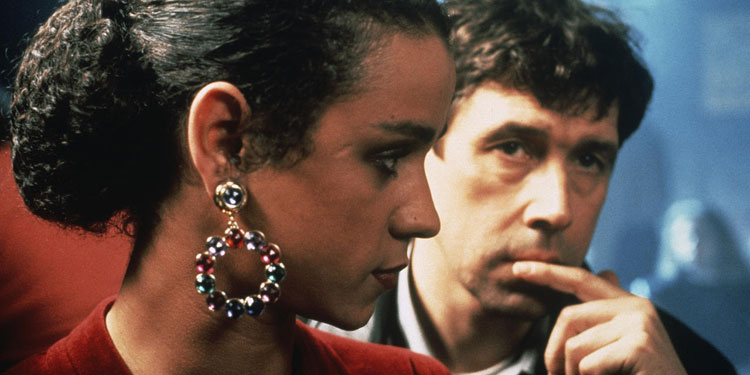
Director: Neil Jordan
Running Time: 112 mins
Certificate: 18
Release Date: February 20th 2017 (UK)

Is 25 years long enough for something not to be considered a spoiler? Well, just in case, don’t read this review if you don’t want to know the ‘twist’ of The Crying Game. That said, I highly suspect that due to cultural changes in the last quarter of a century, it won’t be quite as much of a surprise as it was for most audience members in 1992.
The Crying Game opens with British soldier Jody (Forest Whitaker) getting kidnapped by the IRA in Northern Ireland. They demand that the UK government release one of their top men who’s recently been detained, in exchange for the soldier’s life.
However, one of the kidnappers, Fergus (Stephen Rea), unexpectedly starts to bond with his captive, even though he knows they may have to kill him. Jody tells Fergus about his lover, the beautiful Dil (Jaye Davidson), and asks him to check she’s alright if the worst comes to the worst.
Months later Fergus is in London and does indeed seek out Dil. Initially just curious he soon gets to know her and they begin to fall for one another. However, that’s before a revelation that could derail their romance, which isn’t about the fact Fergus was involved in Jody’s kidnapping. There’s also the inevitable return of the IRA.
On its initial release, the film got a lot of flak in the UK for the fact its ‘hero’ was a sympathetic IRA terrorist, and as a result wasn’t much of a success in the cinema – despite the fact the film itself doesn’t really have much sympathy for what the IRA were up to. In the US meanwhile it was quite a hit, but that largely revolved around the ‘twist’ where [beginning of spoilers], it’s revealed that Dil has a penis. At the time most people didn’t see it coming, but it became such a huge thing that a brief moment in the film completely overshadowed the entire rest of the movie.
It just shows how times change. Nowadays, while there might be some eyebrows raised about making a member of the IRA the lead character, since the Good Friday Agreement a more nuanced portrayal of Irish Republicanism wouldn’t be seen as terrible as it was in 1992. Likewise, having a marketing campaign based around making people jump up and down in the cinema because it’s revealed one of the characters is transgender/transvestite would be seen as pretty tasteless today, and would likely result in protests.
While in the film itself the moment is supposed to be a surprise, it’s more subtly handled than the endless parodies might have you believe. That’s largely thanks to Dil herself and Jaye Davidson’s performance, as while Fergus completely freaks out in a rather unpleasant way, for Dil it’s just one more instance of being mistreated and disappointed, when all she wants is to be loved. Although it wouldn’t be acceptable to handle it in the same way today, in the context of the time and of the movie itself, it makes a lot of sense.
It’s also not done purely for its own sake and for shock value. It’s a key moment in the exploration of the film’s themes. In Fergus’ relationships with both Jody and Dil, The Crying Game looks at someone finding a bond that they wouldn’t have thought possible, which pushes boundaries they never expected to have pushed and challenges them to think of the world in ways they had never thought of before. It’s a tale of possible redemption, not in a grandiose save-the-world way, but in an internal, personal way. The Crying Game is essentially a story about whether people can save themselves by changing their point of view and opening themselves up to new people.
One other thing that probably wouldn’t be seen as okay today is the fact that the film never seems sure what Dil’s gender status it. Both the character herself and the script never seem certain if she’s transgender or transvestite, or whether Dil sees herself as a man, woman or genderqueer. That may well be because those involved in the making of the movie didn’t really have a full grasp of the issues, as evidenced by some of the archive interviews on the Blu-ray, which demonstrate rather antiquated (but extremely common at the time) perceptions of gender identity.
It does work though, even though there are moments when it gets perilously close to treating Dil as a ‘man in a dress’ ‘shemale’. Once again it’s Dil herself who pulls the film through, as she is very aware of people’s perceptions, and while her willingness to mould herself to be what other people want her to be is a character flaw, it’s also perfectly understandable in the context of someone desperate for connection. It also helps that she can be quite sly and humorous about it.
Although the last 25 years mean The Crying Game doesn’t quite have the impact it once did, it’s still a good movie, and despite its dark themes it’s a film that wants to believe in change and that things you might think were impossible for you to countenance, can make you a better person if you open yourself up to them.
The film looks good on this new HD Blu-ray release from the BFI, and comes with a few interesting extras. That includes a lengthy ‘making of…’ documentary, made several years after the movie, but long enough ago that you can still see the attitudes of the time, which gives an interesting insight into both the film and how gender was viewed then (and often is now). It also shows what an unusual film this was, which in its way was rather ground-breaking, as while there may be issues with how Dil is depicted, few successful films before or since have treated a romance between a cisgender person and a trans individual so seriously, working its way to a place where it is a non-issue.
There’s also an alternative ending which is fascinating for just how tone deaf it would have been if it had been part of the final movie. The story of why it was shot is interesting too.
Overall Verdict: It’s not surprising that a film that took on such contentious issues feels a little dated around the edges in some ways, and that its attitudes have now been supplanted, but thanks to its core of hope and dedication to the idea of unexpected bonds being able to change people, it’s still a good movie.
Reviewer: Tim Isaac
Leave a Reply (if comment does not appear immediately, it may have been held for moderation)